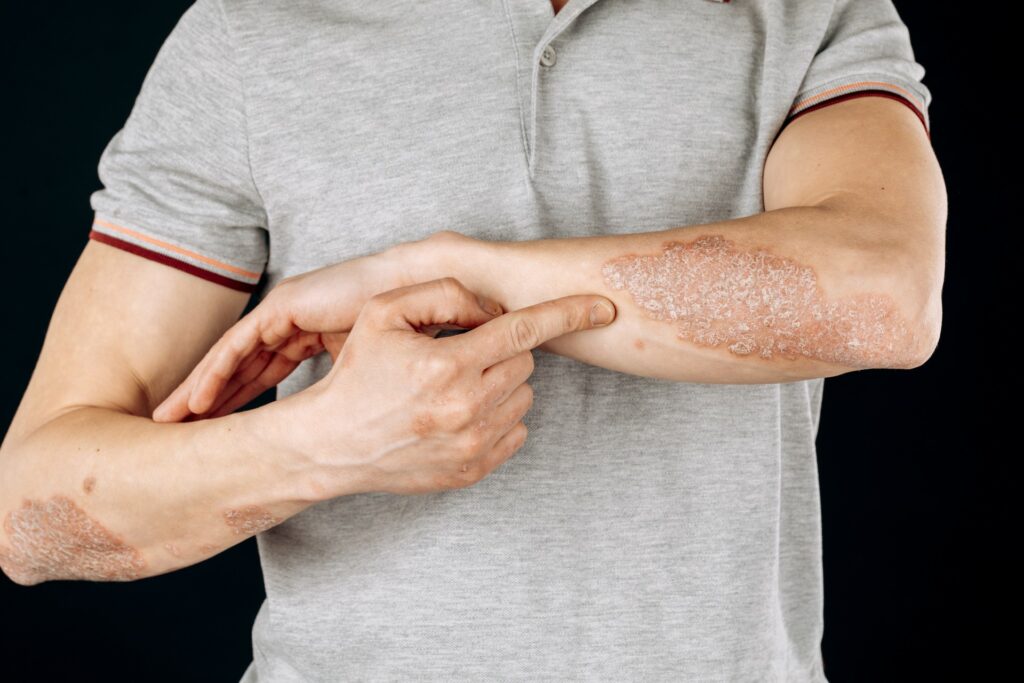Active Psoriasis Care Makes a Difference

Psoriasis affects more than 8 million people in our nation alone. This chronic skin disease results in flaky and itchy flareups and can be painful. There is hope! Those suffering from psoriasis can actively care for the skin and minimize the symptoms. Mental conditions like anxiety and depression have been connected with patients suffering from various skin diseases. Studies show a direct link between psoriasis patients’ physical and psychological health. Psoriasis is an autoimmune disease that does not currently have a cure, but treatment options allow individuals to live everyday lives without being limited by their condition. Partnering with an experienced dermatologist opens the door to many treatment options and makes psoriasis care affordable.
What Triggers Psoriasis Outbreaks
Psoriasis is known to have hereditary ties, meaning those with family members with the condition are more prone to getting it themselves. Several things trigger outbreaks and flareups, including stress, hormone changes, infections, diet, and some medications. Smoking and sun exposure can also cause the skin to become inflamed, worsening symptoms of psoriasis.
The variety of factors that can affect the severity of psoriasis symptoms makes visiting a dermatologist so valuable. Skilled dermatologists spend time with each patient and ask the right questions to determine environmental factors and lifestyle choices to address things that can be changed to improve signs of psoriasis. Only the best dermatologists use their knowledge and experience to help guide patients to proactive care that can minimize signs of psoriasis.
As mentioned, psoriasis does not currently have a cure. However, an active approach to skin care can make this condition manageable. Topical applications are the most common treatment, but some severe cases may warrant other therapies.
Psoriasis Symptoms
Signs of psoriasis most commonly appear on the hands, feet, torso, scalp, knees, and elbows. Although it is easy to cover up some of these areas when flareups occur, blistering hands and flaking scalps are more difficult to “cover up” and prevent people from going about their daily lives because of their insecurity about their skin’s appearance. Psoriasis is not contagious, but when people see irritated and inflamed skin patches or blistering skin due to irritation, they keep their distance, which can take a toll on their psychological health.
Suppose a person is experiencing chronic symptoms of patchy and dry skin that cracks and flakes, brittle and cracked nails, or pain and discomfort in these areas. In that case, they should seek professional advice from a licensed and experienced dermatologist. The best dermatologists have the education, training, and experience to help those suffering from psoriasis.
The Impact of Psoriasis on Psychological and Emotion States
Our nation is dedicated to Americans’ mental health, and dermatologists recognize the connection between skin disease and their patients’ psychological health. Psoriasis may be undetected, as those with the condition think it is normal. Over time, loss of sleep due to discomfort, anxiety, and embarrassment about their skin’s appearance will impact anyone’s emotional and psychological states.
Continued Progress in Psoriasis Treatments
The commonality of psoriasis is good for those with the condition because there are support groups, ways to gain knowledge and understanding about the condition, and active ways to address symptoms, whether through lifestyle changes or treatments.
New psoriasis treatments are continually being introduced into the market, and an excellent dermatologist can guide patients in a personal treatment plan that targets their biggest concerns. Scientists continue to seek longer-term relief through treatments, and a licensed dermatologist will be up to date on what is on the market, knowledgeable about side effects, and able to walk individuals through what treatments best fit their lifestyle.
Active Psoriasis Care at Home
Anyone who has psoriasis can take an active approach to psoriasis skincare and improve symptoms, which can be done at home. There are also things to avoid if you are experiencing symptoms or have been diagnosed with the disease.
Moisturize!
Adding moisture to dry skin can help with flareups. Doing so after a shower and hand washing will minimize drying and provide relief. Adding a layer of moisture to the skin before it is completely dry can also help, so plan to have lotion available throughout the day. Purchase products designed for sensitive skin, especially perfumed lotions and oils, which contain chemicals and often cause more significant irritation.
Anti-Inflammatory Foods
Many dermatologists encourage people with psoriasis to be mindful of what they put in their bodies, which may impact their symptoms. Some foods cause inflammation, and those should be avoided. Numerous websites list foods that are suggested for those fighting inflammation, including antioxidants. A professional dermatologist can also successfully guide patients to healthy food and lifestyle choices to improve symptoms.
If you have psoriasis or symptoms associated with the condition, please contact a local dermatologist for an appointment. If you live in Atlanta, Buckhead Dermatology accepts new patients and offers the best dermatology care available. If you are suffering from skin conditions, you are not alone, and treatments are available—don’t wait to get the relief you deserve.
